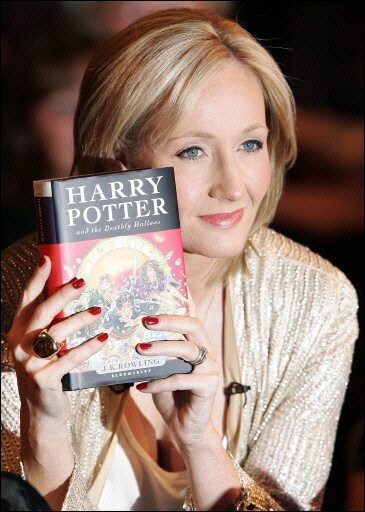
As a child, many of my friends wanted to be Princesses or Astronauts when they grew up. And their mothers would smile amongst themselves, knowing full well that these dreams would never come true.
But I didn’t want to be either of these things. It was the world of Hobbits, Elves and Orcs that captured my heart; middle-earth providing me with an escape from the sandpit and later on, my school work. So as you can gather, it’s a pleasure for me to be sharing my love for this author today.
What you must know is that the concrete world discouraged this passion of mine just the same as my peers. The only difference between me and my friends was that, although I have just about come to terms with thefact that I will never live in Rivendell, I have also come to the knowledge that to be great you have to break boundaries and ignore the people that tell you to grow up.
Because curiosity dies with our childhood and to look behind the things we are forbidden from is to understand that although we cannot change the world we can produce new worlds revolving around the things we love.
As usual, there is survival of the fittest. Because not everyone dares to look and not everyone can be labeled as great. Hence why not every author can be called ‘the father’ of their field like Tolkein.
Why Tolkein?
I have a habit of choosing authors for my ‘key people’ posts, hands up, I’ll admit it. But the reasoning behind it isn’t purely selfish, I assure you. Tolkein has much to teach us. And writers and non-writers, even the businessman could learn something from the obvious success of Tolkien’s novels. How they hit the hearts of his audience perfectly and how they are still celebrated today in both movies and merchandise.
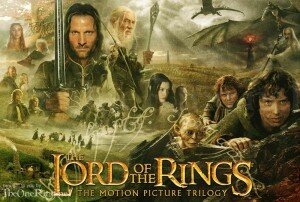 But it’s actually not this element I’m focusing in on this post. My focus for this post is persistence. Because, the Lord of the Rings wasn’t just a novel in his Tolkein‘s head. It was a world, an idea. An idea that took not only seventeen years of typing at a desk that was too small for him but involved Tolkien making maps and languages to ensure it was his very best work.
But it’s actually not this element I’m focusing in on this post. My focus for this post is persistence. Because, the Lord of the Rings wasn’t just a novel in his Tolkein‘s head. It was a world, an idea. An idea that took not only seventeen years of typing at a desk that was too small for him but involved Tolkien making maps and languages to ensure it was his very best work.
It’s Global Entrepreneurship Week this week and I think we reduce the role and relationship between creativity and production too much. We tend to view them separately and what I want you to consider, as we learn about this phenomenal idol of mine, is that these two elements are branches of the same tree. Because to produce well, you have to have something unique and inspired to offer; and to create well, you have to have the discipline behind you to bring that idea to life.
Both an Entrepreneur and a Writer must be balanced, determined and passionate in what they do.
There & Back Again – The Journey that Made Tolkien…
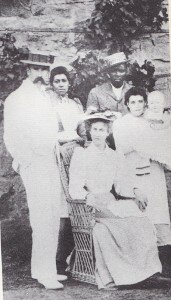 In the year 1892 Ronald Tolkien was born in Bloemfonein, South Africa to mother Mabel and father Arthur Tolkien. Arthur was a music enthusiast, and quite possibly a strong source of inspiration for the much loved songs laced within Tolkein’s novels.
In the year 1892 Ronald Tolkien was born in Bloemfonein, South Africa to mother Mabel and father Arthur Tolkien. Arthur was a music enthusiast, and quite possibly a strong source of inspiration for the much loved songs laced within Tolkein’s novels.
Ronald had one other sibling, a younger brother called Hilary.
Three years after Ronald‘s birth, his mother took the children to visit England on what was intended to be an extended family visit. His father died the following year in South Africa leaving the family without a source of income and the sons without fatherly influence.
As a result of this tragedy, the Tolkien’s had no choice but to move in with Mabel’s parents in Birmingham where the young author grew up.
It is thought that, although Birmingham is quite a dull and industrial setting (myself and Joe would know) it’s this place that inspired much of the locations in the Lord of the Rings. Which just goes to show that you can draw inspiration from the most unlikely of places if you’re willing to just look and use your imagination.
Mabel taught her children many languages and the skill of drawing. Tolkien was a particularly intelligent child and was extremely willing to learn new things. By the age of four he could read and write fluently and enjoyed stories of all kinds; but in particularly fantasy.
As he grew older he began to study Greek and Old English developing a further passion for languages outside his own. Things were starting to get back on track for the family. But in 1904 however, disaster struck again and Tolkien’s mother died of diabetes.
Orphaned at the age of twelve, he and his brother fell into the hands of a family friend; a Priest with the aim of raising the boys to be strong Catholics. Despite the religious pressures, his love for stories and languages continued, later inspiring him to write what he had enjoyed reading throughout his adolescent years.
At sixteen, Tolkein met Edith Mary Bratt. Both Ronald and Edith were orphans with big personalities and could often be found throwing sugar lumps into the hats of passers-by from the balconies of teashops. It was hardly surprising to those close to the pair that by 1909, the pair had declared love for one another.
However, his guardian Father Morgan, coming from a strong Catholic belief, did not approve of this relationship. He saw Edith as a distraction to the young boy and was not happy for his son to be involved with a strong Protestant girl. The fact that Tolkien failed his exams only heightened this worry and he was forbidden from seeing her ever again.
Being three years his senior, she moved away shortly after and Tolkein began his term at Oxford University.
But on his 21st birthday he wrote to Edith again, who was now engaged to another man. The two met secretly and were engaged just a year before war was declared. It is thought that this forbidden relationship inspired the tale of love between Arwen and Aragorn in the Lord of the Rings.
His relatives were shocked when he delayed enlisting to the war until completing his degree in English Language and Literature. He seemed to be rebelling just about every boundary that had been set for him, for his own greater good and purpose. This shows to us now, the extent of struggle that Tolkein was willing to go through to get his story out there and to stay inspired.
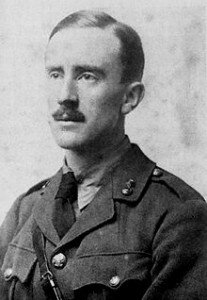 He returned to the Military field in later years where he was made Lieutenant and fort during the battle of the Somme, inspiration perhaps for the wars that went on in Middle Earth. Tolkein suffered strongly for many years with shell shock and was sent home to his wife, whom, had also been greatly suffering on the home front.
He returned to the Military field in later years where he was made Lieutenant and fort during the battle of the Somme, inspiration perhaps for the wars that went on in Middle Earth. Tolkein suffered strongly for many years with shell shock and was sent home to his wife, whom, had also been greatly suffering on the home front.
Many of Tolkien’s friends who he’d secretly met with at the University library were killed in battle and he spent the remainder of the war between hospitals and garrison duties.
When the war was over, his focus lay again with writing. He wrote ‘The Simarillion’ the year following and became a freelance tutor of English to support his growing family.
In 1929 he gained a special friendship in C.S Lewis, future author of the Chronicles of Narnia Series. Little did both know, that their greatest creations would come as a result of this friendship.
When marking papers the following year, Tolkein came across a blank exam sheet. And the story that had been bubbling from years of inspiration, began to spill across the page. He wrote a single line ‘In a hole, underground there lived a hobbit’, and just this single line, this act of spontaneity, led him to think… what are hobbits? What are they like?
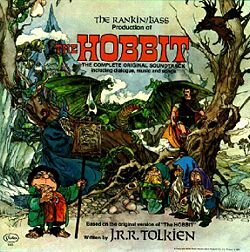 Thus, the Hobbit was born and published six years later. Proving that every good idea is worthy of being written down. A sequel was demanded and The Lord of the Rings were finally published in 1954, seventeen years after it’s prequel. He described the experience of handing it over to his publisher as having ‘exposed my heart to be shot at’. But he took a chance, and it paid off. The Lord of the Rings is still today one of the most famous and well-respected fantasy series in all of literature.
Thus, the Hobbit was born and published six years later. Proving that every good idea is worthy of being written down. A sequel was demanded and The Lord of the Rings were finally published in 1954, seventeen years after it’s prequel. He described the experience of handing it over to his publisher as having ‘exposed my heart to be shot at’. But he took a chance, and it paid off. The Lord of the Rings is still today one of the most famous and well-respected fantasy series in all of literature.
And after ‘Farmer Giles of Ham’ was published Tolkein was able to retire producing multiple works in his time of resting such as ‘The adventures of Tom Bombadil’ , ‘Tree and Leaf’ and ‘Smith of Wooton Major’. All of Tolkein’s creations were snapped from the shelves earning him a CBE from the Queen and the finances to move to the quiet town of Bournemouth in his later years.
Both he and his wife passed away in the early years of the 1970′s leaving behind his legendary tales and magical kingdoms, a source of escape and inspiration for future writers, and his own legendary tale of persistence and success.
The cost, it seems, in creating what he did had paid off and he will never be forgotten by any that have come across his unique work.
But remember it is not enough for the self-developer to simply just admire someone else’s life work. But to be the best that we can be, we must all learn from the backstage ingredients that went into their greatness and implement it into our own…
The Precious Lessons We Can Learn from Tolkien
It is written in my life-blood, such that it is, thick or thin; and I can no other.
Why do we create?: Talking About Tolkein…
As a creator myself, I work towards answering this question, why do we create, everyday. There are obvious answers out there. To make money. To make a living. And there are poetic answers out there. To reflect life. To help someone. But for J.R.R Tolkien it was a little different. He created mostly for himself and his four children.
Having openly admitted that there was no theses, no underlying teaching in his works it’s important that we consider, from his level of success and prestige, why Tolkien wrote the Lord of the Rings. Because you’d assume his success would be a result of spreading his attention for the majority.
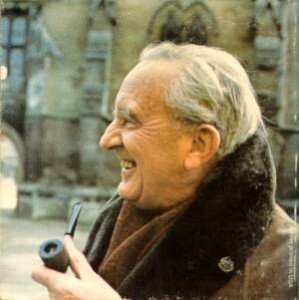 It’s my belief, that for him, creating was having the courage to express his deepest fears and his wildest dreams. He stated in his life that the purpose for his books was to create what he loved and what he thought society lacked; fantasy for adults.
It’s my belief, that for him, creating was having the courage to express his deepest fears and his wildest dreams. He stated in his life that the purpose for his books was to create what he loved and what he thought society lacked; fantasy for adults.
But because of his strict upbringing, in a strong Catholic influence, I think this was more of a challenge than we’d expect for the author, but also the inspiration for the forbidden romances and the horrors within his stories.
Both of the things he believed in are discouraged of us in adulthood.
Mentally we are told to stop thinking of talking trees and goblins and fairies. Physically we are told to put down the pen and succumb to the real world. But as creators it’s important to consider that perhaps it’s the child within us that forms our creative side.
The fearless side that isn’t afraid to voice what our imagination forms. The voice that says we can be whoever we want to be. Whether that’s becoming an author and breathing life to your forbidden world, or a reader and becoming a friend to the characters on the quest.
Persistence: Greatness Comes at a Cost
You don’t need me to tell you the extreme persistence this must have taken. His masterpiece came at a great cost of time and effort and nights spent at the desk. But it’s important that we understand, as modern creators that something’s don’t just happen. Discipline is often the key to being not just a writer or an artist; but a great one.
The way I think of it is that you could take a year of your time to write an average book, and be remembered as an average writer. Or you can take all the time you need, take that risk, live like a child for a moment and write something great. You only get out of life, what you put in and sometimes the price of making a masterpiece is costly.
Learning from those around you: Perfectionism & Production
Speaking to like-minded people is important for any self-developer in both battering ideas, learning from each other and encouraging skill development.
Tolkien and Lewis envied each others work, but also shared a common love of mythical tales. They valued these differences in each other and through these values Tolkien taught Lewis how to combine his rational and irrational mind, and Lewis taught Tolkien how to beat his introverted mind-set.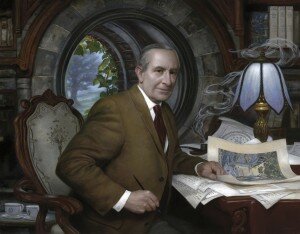 Tolkien was quite the perfectionist. This may sound like a good quality to you. It’s the quality that ensured the languages he created were flawless and the plots without fault, but to the creator, it was also a possible killer for his work. C.S Lewis convinced Tolkien that his best was his aim, not perfection. And it was C.S Lewis’ influence that encouraged and prompted Tolkein in sharing his work outside himself and his four children.
Tolkien was quite the perfectionist. This may sound like a good quality to you. It’s the quality that ensured the languages he created were flawless and the plots without fault, but to the creator, it was also a possible killer for his work. C.S Lewis convinced Tolkien that his best was his aim, not perfection. And it was C.S Lewis’ influence that encouraged and prompted Tolkein in sharing his work outside himself and his four children.
Inspiration from a dull place – Concrete Worlds, Creative Minds
Tolkien was determined to bring colour to the concrete world. And so he twisted what he saw around him, even the dullest of scenes, into a collection of books that are still globally labeled the literature Godfather of all fantasy series‘.
His name is still whispered on the lips of every aspiring writer. Not because of admiration of his persistence, perfectionism or his hard work, we never get to see that and it was never much appreciated at the time, but because of what he created. An escape for his readers. His works were not only the creation of a unique story, but an entire new world with it’s own languages, maps and species.
And because he wrote what he loved, what he saw lacking, the results were phenomenal.
Listening to your inner child: Your Dreams & Mindset
Tolkien’s love for fantasy lay with his childhood; but instead of leaving it when the war came along, he fort for his passion and produced phenomenal results. But this all came about in having the mindset of fearlessness, to listen and to question everything. If he hadn’t let himself wonder ‘What is a Hobbit?’ we wouldn’t be thinking about him today.
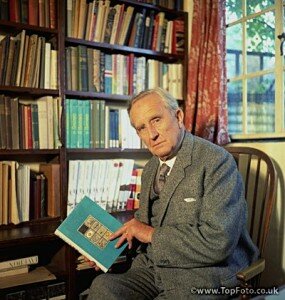 Through the gift that Tolkien gave me, I realised that I could still live in the minds of these characters and their world through creation. Because as creators, we are free to go anywhere we want to. To be anyone we want to, and to take our audience with us. So in a sense, the reason I believe Tolkien is such a good creator, is because his work, his nature and his love for fantasy stemmed from his welcome (rather than rejection) of childhood.
Through the gift that Tolkien gave me, I realised that I could still live in the minds of these characters and their world through creation. Because as creators, we are free to go anywhere we want to. To be anyone we want to, and to take our audience with us. So in a sense, the reason I believe Tolkien is such a good creator, is because his work, his nature and his love for fantasy stemmed from his welcome (rather than rejection) of childhood.
In summary, what makes us great is a fearlessness to use our imagination, to take a risk and to see where such idea will take us. The question is, what’s the worst that could happen?
To reflect this in your work, will make a more flexible product. To reflect this in your mindset, will make a more flexible you. A ‘you’ that is not only able to create anything and believe in your creations, but to have the courage to put your beliefs and your passions out there to the world.
Wrote by Aimee Hall

